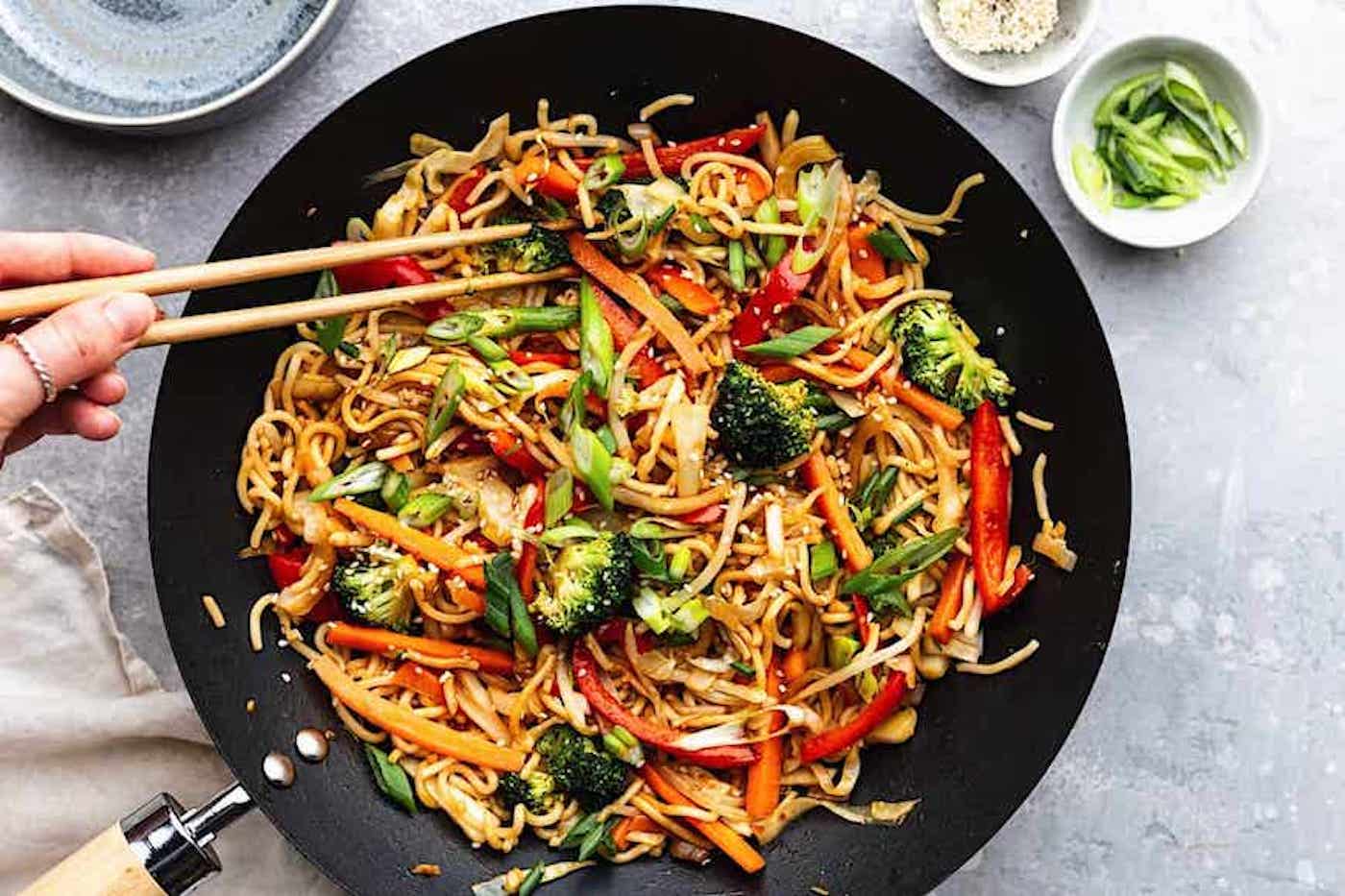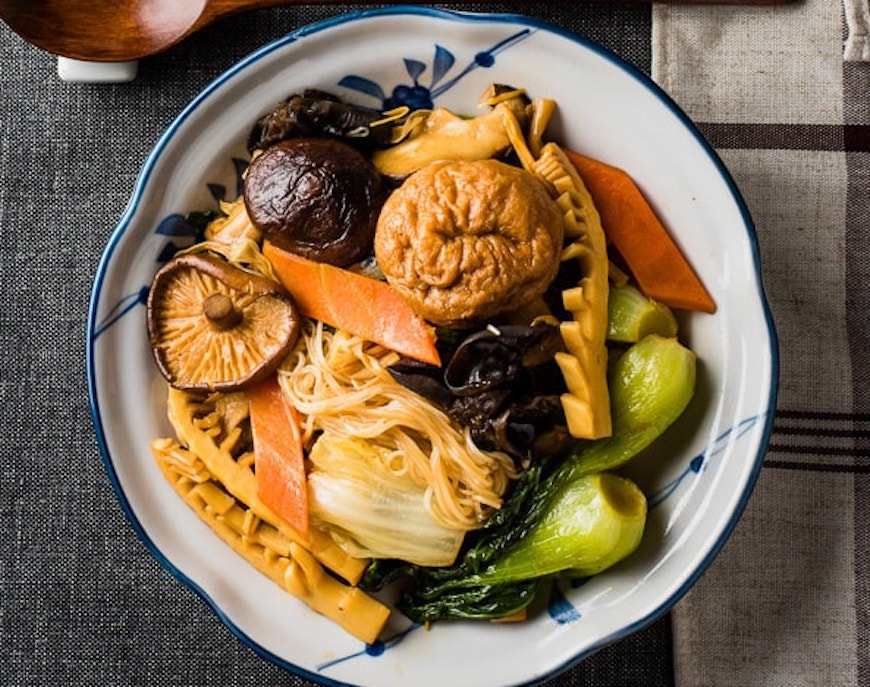In the vibrant tapestry of global cuisine, vegetarian Chinese food stands out as a symphony of flavors, textures, and nutritional goodness. Rooted in ancient traditions, this culinary art form blends the wisdom of Chinese medicine with the bounty of nature, resulting in dishes that are not only delicious but also nourishing to the body and soul.
From the bustling streets of Beijing to the tranquil countryside of Sichuan, vegetarian Chinese cuisine captivates taste buds with its diverse array of ingredients, cooking techniques, and regional specialties. Tofu, vegetables, and sauces take center stage, transformed into culinary masterpieces through stir-frying, steaming, and deep-frying, each method preserving the vibrant colors, flavors, and nutrients of the fresh produce.
Introduction
Vegetarian Chinese cuisine is a vibrant and flavorful branch of Chinese cooking that centers around plant-based ingredients. Rooted in ancient Buddhist traditions, it has gained popularity worldwide for its diverse flavors, textures, and health benefits.
The history of vegetarian Chinese cuisine is closely tied to the spread of Buddhism in China. Buddhist monks, who followed a meatless diet, developed a wide range of plant-based dishes to sustain themselves. These dishes, often centered around tofu, vegetables, and grains, were not only nutritious but also incredibly flavorful.
Common Ingredients
Vegetarian Chinese cooking relies on a variety of ingredients to create its unique flavors and textures.
- Tofu: A versatile soybean-based product, tofu comes in different textures and can be used in a variety of dishes, from stir-fries to soups.
- Vegetables: Chinese cuisine incorporates a wide array of vegetables, including leafy greens, root vegetables, and mushrooms. These vegetables are often cooked using techniques like stir-frying, steaming, and braising.
- Sauces: Chinese vegetarian cooking uses a variety of sauces to add flavor and complexity to dishes. These sauces can be made from soy sauce, rice vinegar, sesame oil, and other ingredients.
Health Benefits of Vegetarian Chinese Food
Vegetarian Chinese food is a delicious and nutritious way to enjoy the flavors of Chinese cuisine. It is packed with vitamins, minerals, and antioxidants that can help improve your overall health and well-being.
One of the biggest health benefits of vegetarian Chinese food is its low risk of chronic diseases. Studies have shown that people who eat a vegetarian diet are less likely to develop heart disease, stroke, type 2 diabetes, and some types of cancer.
Reduced Risk of Chronic Diseases
There are several reasons why vegetarian Chinese food may help reduce the risk of chronic diseases. First, it is typically low in saturated fat and cholesterol, which are two major risk factors for heart disease. Second, it is high in fiber, which can help lower blood pressure and cholesterol levels.
Third, it is a good source of antioxidants, which can help protect cells from damage.
In addition to these general health benefits, vegetarian Chinese food can also provide some specific health benefits. For example, tofu is a good source of protein and calcium, which can help to strengthen bones and muscles. Soy products, such as tofu and tempeh, have also been shown to reduce the risk of breast cancer.
Popular Vegetarian Chinese Dishes
Vegetarian Chinese cuisine offers a diverse array of delectable dishes that cater to various dietary preferences and provide a symphony of flavors. From the fiery heat of Mapo Tofu to the harmonious blend of vegetables in Buddha’s Delight, these dishes showcase the versatility and creativity of Chinese culinary traditions.
Mapo Tofu
Mapo Tofu is a classic Sichuan dish that tantalizes taste buds with its spicy and savory flavors. Silken tofu takes center stage, simmering in a vibrant sauce made from fermented bean paste, chili oil, and minced pork (or vegetarian alternatives like mushrooms or soy protein).
The result is a textural symphony of tender tofu and a rich, aromatic sauce that leaves a lasting impression.
Buddha’s Delight
Buddha’s Delight, also known as Luohan Zhai, is a vegetarian feast that embodies the essence of Buddhist cuisine. This dish is a harmonious medley of vegetables, mushrooms, and tofu, each contributing its unique texture and flavor to create a symphony of tastes.
The vegetables are stir-fried or braised in a savory sauce, resulting in a colorful and nutritious dish that is both visually appealing and deeply satisfying.
Spring Rolls
Spring rolls, known as Chun Juan in Chinese, are a quintessential appetizer or snack in Chinese cuisine. These crispy, golden-brown rolls are filled with a delectable combination of shredded vegetables, glass noodles, and aromatic herbs. The rolls are expertly wrapped in thin pastry sheets and deep-fried until they achieve a perfect balance of crispy exterior and tender, flavorful interior.
Vegetarian Chinese Cooking Techniques
Vegetarian Chinese cuisine offers a diverse range of cooking methods that not only enhance the flavors of the ingredients but also preserve their nutritional value.
These techniques have been refined over centuries to create vibrant and healthy dishes that are enjoyed worldwide.
Stir-Frying
Stir-frying is a popular technique that involves cooking ingredients rapidly in a hot wok or pan with a small amount of oil.
This method helps retain the crispness, color, and nutrients of the vegetables while infusing them with delicious flavors.
Steaming
Steaming is a gentle cooking method that involves placing ingredients in a steamer basket over boiling water.
This technique preserves the natural flavors and textures of the vegetables while reducing the need for oil or additional seasonings.
Deep-Frying
Deep-frying is a technique where ingredients are submerged in hot oil until golden brown and crispy.
While this method is often associated with unhealthy cooking, it can be used to create delicious and nutritious dishes when done in moderation.
Additional Techniques
- Braising: This technique involves simmering ingredients in a flavorful liquid until tender.
- Sautéing: This method involves cooking ingredients in a small amount of oil over medium heat.
- Baking: This technique involves cooking ingredients in an oven until golden brown and crispy.
- Roasting: This method involves cooking ingredients in an oven until tender and caramelized.
Vegetarian Chinese Restaurants

From the bustling streets of Beijing to the vibrant neighborhoods of New York City, vegetarian Chinese cuisine has captivated taste buds worldwide. Discover some of the most renowned vegetarian Chinese restaurants that offer delectable dishes and an unforgettable dining experience.
These restaurants have carefully crafted menus that showcase the diversity and flavors of Chinese vegetarian cooking, using fresh, seasonal ingredients and traditional techniques to create dishes that are both authentic and innovative.
Notable Vegetarian Chinese Restaurants:
- Bodhi Vegan, Los Angeles: Located in the heart of Los Angeles, Bodhi Vegan is a culinary gem that offers an extensive menu of plant-based Chinese dishes. Their signature dishes include the Crispy Walnut Shrimp, a vegan take on the classic shrimp dish, and the Buddha’s Delight, a colorful medley of vegetables and tofu in a savory sauce.
- Green Garden, San Francisco: Nestled in the vibrant Chinatown district, Green Garden has been a beloved vegetarian Chinese restaurant for over 30 years. Their menu features traditional dishes such as Mapo Tofu, a spicy and flavorful dish made with tofu, and the Lion’s Head Meatballs, made with a combination of mushrooms and vegetables.
- Hutong, London: Located in the heart of London’s Soho district, Hutong offers a modern take on Chinese vegetarian cuisine. Their menu highlights include the Steamed Crystal Dumplings, filled with a variety of vegetables and served with a flavorful dipping sauce, and the Kung Pao Cauliflower, a crispy and tangy dish that is a favorite among diners.
- Pure Veggie House, New York City: Situated in the bustling East Village, Pure Veggie House is known for its authentic Chinese vegetarian dishes. Their menu boasts a wide selection of noodle soups, including the Dan Dan Noodles, made with a spicy peanut sauce, and the Wonton Soup, filled with savory vegetable wontons.
- Loving Hut, Multiple Locations: With locations worldwide, Loving Hut is a global chain of vegan restaurants that offers a variety of Chinese-inspired dishes. Their menu includes favorites such as the Orange “Chicken,” a plant-based take on the classic dish, and the General Tso’s Tofu, a sweet and tangy dish that is sure to satisfy.
Tips for Cooking Vegetarian Chinese Food
Cooking vegetarian Chinese food at home can be a rewarding experience, allowing you to enjoy delicious and healthy meals while exploring the diverse flavors of Chinese cuisine. Here are some useful tips and tricks to help you create authentic and flavorful vegetarian Chinese dishes:
Selecting the Right Ingredients
Choose fresh and high-quality vegetables: The foundation of vegetarian Chinese cooking lies in the quality of your ingredients. Opt for fresh, vibrant vegetables that are free from blemishes or signs of spoilage. Look for vegetables that are in season, as they tend to have better flavor and nutritional value.
Use a variety of vegetables: Don’t limit yourself to a few common vegetables. Experiment with a wide variety of vegetables, including leafy greens, root vegetables, mushrooms, and legumes. This will add diversity to your dishes and ensure that you’re getting a well-rounded range of nutrients.
Include sources of protein: While vegetables are the main focus of vegetarian Chinese cooking, it’s important to include sources of protein to create balanced and satisfying meals. Tofu, tempeh, seitan, and beans are all excellent sources of plant-based protein that can be incorporated into a variety of dishes.
Using the Appropriate Cooking Techniques
Master the art of stir-frying: Stir-frying is a fundamental technique in Chinese cooking, and it’s particularly well-suited for vegetarian dishes. Use a well-seasoned wok or large skillet over high heat, and add a small amount of oil. Toss the vegetables quickly and continuously to ensure even cooking and prevent them from sticking.
Explore other cooking methods: In addition to stir-frying, there are various other cooking techniques that can be used to prepare vegetarian Chinese dishes. Steaming, roasting, and braising are all excellent ways to bring out the natural flavors of vegetables and create tender and flavorful dishes.
Achieving the Right Balance of Flavors
Use a variety of sauces and seasonings: Chinese cuisine is known for its bold and complex flavors, which are often achieved through the use of a variety of sauces and seasonings. Soy sauce, oyster sauce, rice vinegar, and sesame oil are just a few of the essential ingredients that can be used to create authentic Chinese dishes.
Experiment with different flavor combinations: Don’t be afraid to experiment with different flavor combinations to create unique and exciting dishes. Sweet and sour, spicy and salty, and bitter and sweet are just a few of the classic flavor combinations that can be found in Chinese cuisine.
Closing Summary

As we conclude our exploration of vegetarian Chinese food recipes, we are left with a deep appreciation for the culinary artistry and health benefits that this cuisine offers. Whether you’re a seasoned vegetarian or simply seeking to incorporate more plant-based meals into your diet, these recipes provide a delightful and nutritious gateway to a world of culinary exploration.
Common Queries
Q: What are some of the most popular vegetarian Chinese dishes?
A: Some of the most beloved vegetarian Chinese dishes include Mapo Tofu, Buddha’s Delight, Spring Rolls, and Wontons in Chili Oil, each offering a unique blend of flavors and textures.
Q: How can I make vegetarian Chinese food at home?
A: Cooking vegetarian Chinese food at home is a rewarding experience. With the right ingredients, cooking techniques, and a dash of patience, you can create authentic and delicious dishes that rival those found in restaurants.
Q: Are there any specific health benefits to eating vegetarian Chinese food?
A: Vegetarian Chinese food is a treasure trove of nutritional goodness. It is rich in vitamins, minerals, antioxidants, and dietary fiber, all of which contribute to a healthier lifestyle and may reduce the risk of chronic diseases.
